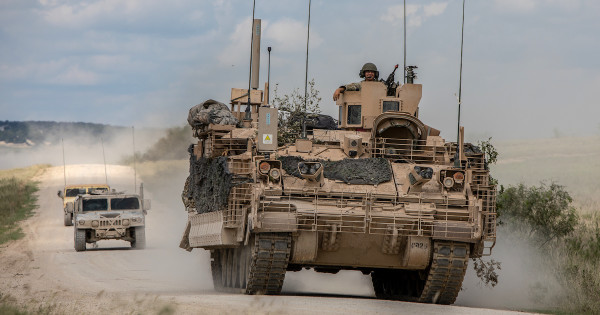

Have no fear: the Army’s next battlewagon is officially here.
The first Armored Multi-Purpose Vehicle (AMPV) built as replacement for the Army’s Vietnam-era M113 armored personnel carriers has officially rolled off the assembly line for delivery to the service, defense contractor BAE Systems announced on Monday.
BAE was slated to start production of the first batch of 450 of a total of 2,907 AMPVs as of December 2018, according to the Congressional Research Service, with the Army awarding a $575 million contract for the initial production of the vehicle in February 2019.
“Finalizing the first AMPV for delivery marks a major milestone for the program and the U.S. Army,” BAE AMPV program director Bill Sheehy said in a statement. “The AMPV is designed to meet the Army’s missions for the Armored Brigade Combat Teams (ABCT), and lay the foundation for the future of the battlefield.”
The vehicle comes in five distinct variants tailored specific mission roles: General Purpose, Medical Evacuation, Medical Treatment, Mortar Carrier, and Mission Command.
According to BAE, the AMPV “leverages aspects of the Bradley Infantry Fighting Vehicle and M109A7 self-propelled howitzer” for a vehicle with 73 percent more carry capacity compared to the M113 APC and significantly improved capabilities over other platforms.
Indeed, limited user testing of the AMPV conducted in fiscal year 2018 indicated that the vehicle demonstrated “superior power and mobility” over the M113, as well as increased operational mission availability and reliability, per the CRS report.
The AMPV family of vehicles “provides significant power, mobility, interoperability, and survivability improvements for the ABCT,” BAE vice president Jeremy Tondreault said in a statement. “The AMPV has demonstrated outstanding survivability and force protection as well as flexibility and growth for the future.
The Army has completed nearly two dozen AMPV tests and was initially expected to field 258 AMPVs as part of the European Deterrence Initiative some time in fiscal year 2020, with two brigades worth of vehicles fielded by the end of calendar year 2020, according to the CRS report.
However, BAE is currently behind schedule in its actual delivery of the AMPV, which was initially expected for March 2020, due to “tooling and assembly line challenges,” a delay which has induced the Army to reprogram $18.5 million in funds to other programs, according to Inside Defense.
Here’s how we imagine the current conversation between the Army and BAE Systems looks like:
BAE: I’m bored, come over
Army: I can’t, I’m reprogramming funds to other vehicle programs and you’re already delayed
BAE: But I offer a major increase in survivability over other existing platforms!
Army:
